commentary Commentary
Commentary: Are penalty shootouts the best way to decide major tournaments like Euro 2020?
England’s loss in the Euro 2020 final to Italy through spot-kicks may seem cruel but the alternatives could be even less tenable, says John Duerden.
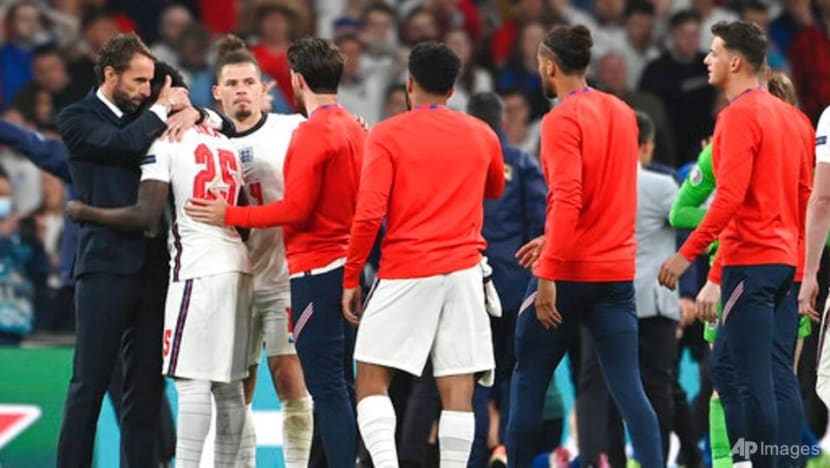
England's manager Gareth Southgate, left, embraces Bukayo Saka after he failed to score a penalty during a penalty shootout after extra time during of the Euro 2020 soccer championship final match between England and Italy at Wembley stadium in London, Sunday, July 11, 2021. (Andy Rain/Pool via AP)
SINGAPORE: It may have been 55 years since England last appeared in the final of a major football tournament. Despite that, there was something familiar about its penalty shootout defeat to Italy on Monday morning.
The Italians scored three of their five spot-kicks to England’s two to win Euro 2020. When the tears of the English fans dry up and the heartbreak turns into introspection, there may be a return to another old argument - whether penalties are the best way to settle such significant games.
The English have more cause to rue the adoption of penalty shootouts, first used in a major tournament at the 1976 European Championships, than most.
HAUNTING PROSPECTS
This week’s loss marked the Three Lions’ seventh failure in 10 attempts at penalty shootouts in a major tournament.
England have lost four out of five of their penalty tie-breakers at the European Championships and three out of four at World Cups. And all this only since the 1990 World Cup. No wonder the prospects of penalty shootouts so vividly haunts the nation.
Had things gone a little differently, England could have more than one trophy, won back in 1966, in its trophy cabinet.
READ: Commentary: Euro 2020 - England really isn't a football underdog anymore
Continental rivals Germany, on the other hand, have won six out of seven shootouts in major tournaments. If you swap the record of the two countries then their football histories could be very different.
There is no doubt that, in the early days, England’s approach to penalties was a little casual.
Glenn Hoddle, head coach at the 1998 World Cup when the team lost on penalties to Argentina, famously said that the team had not practised taking spot-kicks.
The prevailing attitude at the time was that the format was something of a “lottery” and was thus pointless preparing for. With losses through penalties in three more major tournaments thereafter, England changed their approach to shootouts.
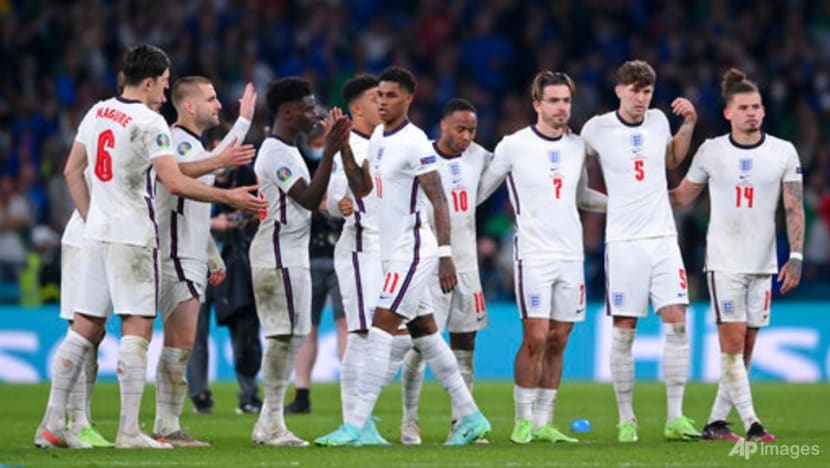
Ahead of the 2018 World Cup, Dan Ashworth, the technical director of the English FA, told The Telegraph that the English team not only practises taking penalties but also prepared mentally and tactically.
“So, there’s been a little bit of research done to show that English players are quick to the ball when the whistle goes … You look at the other nations, they take a bit more time.”
It could be that history is a major factor. The more England lose on penalties, the more they are dreaded. It is striking that for all the talk of the English team at Euro 2020 being a very different one to those of old, the tournament ended in the same old way for them.
THE DESTRUCTIVE BURDEN
Perhaps the tiniest of consolations for Marcus Rashford, Jadon Sancho and Bukayo Saka, who missed England’s penalties against Italy, is that there are plenty of other English players who have gone through a similar experience.
READ: Commentary: Euro 2020 - England is turning out to be a winning team
The team’s head coach Gareth Southgate himself missed the crucial penalty against Germany in the semi-final of the 1996 Euros.
“We prepared as well as we could for that and that’s my responsibility, I chose the guys to take the kicks,” Southgate said after the loss.
Such words may only help so much. Rashford, Sancho and Saka have already been subject to racist abuse on social media. The emotions involved in missing their spot-kicks, especially for Saka who took the last one and is only a tender 19 years of age, could be difficult to deal with.
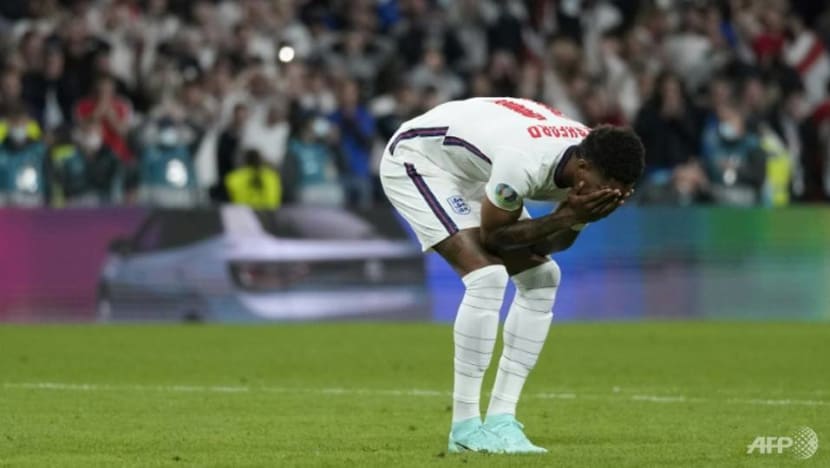
Even 25 years later, Southgate is still talking about his miss. "I can't change the fact the guys I played with in '96 didn't get to play in a final and that will always live with me," he said after England defeated Germany 2-0 in the second round on Jun 29.
But English players aren’t the only victims of the dreaded penalty shootouts.
Roberto Baggio, was perhaps the best player in the world in 1994 but he will be forever associated with his penalty miss in the final of the World Cup that year.
While his two team-mates, Franco Baresi and Daniele Massaro, both missed, the defining image of the tournament was Baggio – whose five goals brought Italy to the final in any case - shooting over the bar as Brazil celebrated.
“They had to choose one image from the finals and they chose my mistake,” he wrote in his autobiography. “It’s the same sense of bitterness as in 1994,” he said in an interview with FourFourTwo magazine in 2018. “It hasn’t diminished and I don’t think it will ever go away.”
IS IT TIME FOR A CHANGE?
Football has long struggled with how to settle a draw in cup competitions and there are alternatives. The 1968 European Championship final which ended in a tie between Italy and the Soviet Union was decided through the drawing of lots. The Italians won that one too.
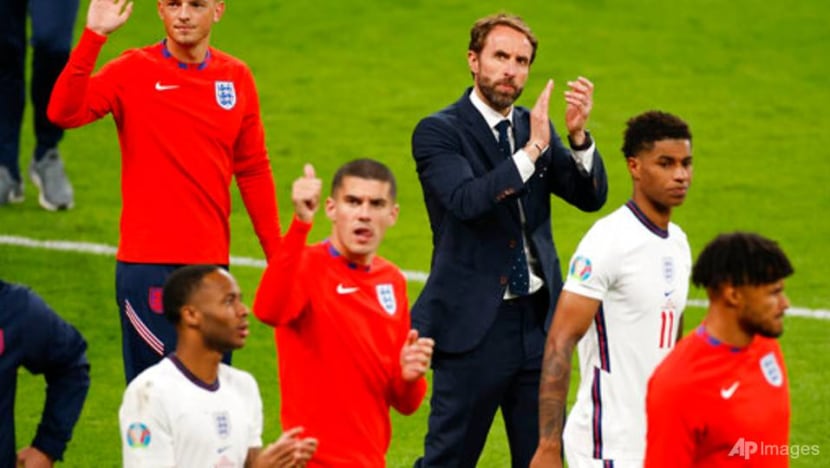
That, as well as the coin toss, was seen as too unfair and random a way of deciding tie-breakers, though England may favour a return. In the past, there were replays, such as in England’s FA Cup, but these take time and can be logistically challenging especially when time is short.
In the early years of the Major League Soccer, from 1996 to 2000, the Americans went a different way.
Instead of penalties, there were one-on-ones between attackers, starting from 35 yards out, and the goalkeeper, allowed to advance off his line. There have been calls to bring the format back.
Former United States international Alexi Lalas wrote on social media in January 2020: “Love to bring it back. Much more related to the game than a static kick from the penalty spot.”
However, this method could add more time to decide the proceedings, something fans may not have the patience for, especially those in different time zones where waiting for the eventual winner stands in the way of sleep.
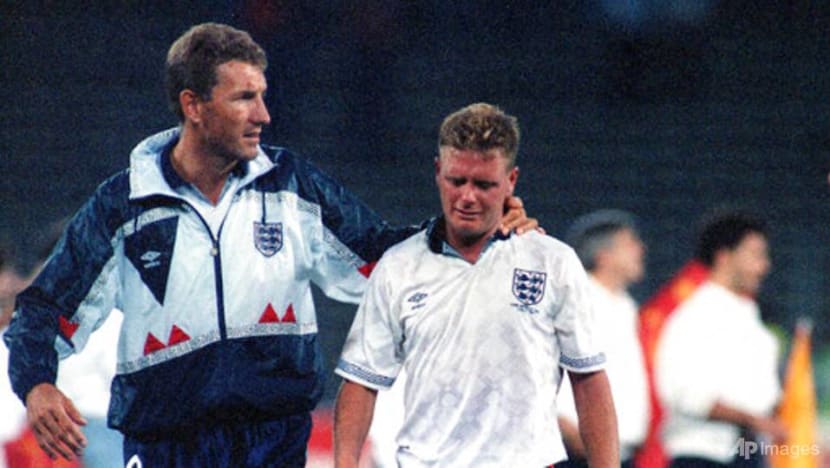
Other options include continuing the game under golden goal rules --which means that the team who scores next wins - while removing a player from each team every three or five minutes.
The theory is that the tactical process of deciding which players to take off would be fascinating and the greater amount of space on the pitch would result in an exciting spectacle and, before long, a goal.
Perhaps the best option however is keeping the penalty shootout format as it is but changing the timing. Instead of taking the kicks after 120 minutes, they are taken after 90.
After the shootout, extra time continues as normal for 30 minutes but if no team can win then the result of the penalties comes into play.
READ: Commentary: Euro 2020 – a football tournament where the big players come from China and the US
READ: Commentary: Why were we shocked by the breakaway Super League? Football’s been dying for a while
This would keep the drama of the shootout but should reduce the pressure on the takers. Even if they miss, they will still have 30 minutes to help their team to victory and earn themselves redemption.
It could be that this would encourage the winner of the shootout to become defensive for the next half-hour, but it would also mean that the other team would have to attack. As it is, extra-time is often dull anyway as tired teams settle for the impending shootout.
There doesn’t seem to be much desire to change the current format which, while cruel for those who miss, is dramatic, quick, effective and, for the neutral at least, enjoyable.
But if change comes, it will likely be greeted with open arms in England.
John Duerden has lived in Asia for 20 years and covers the region’s sporting scene. He is the author of three books including Lions & Tigers - The History of Football in Singapore and Malaysia (2017).















